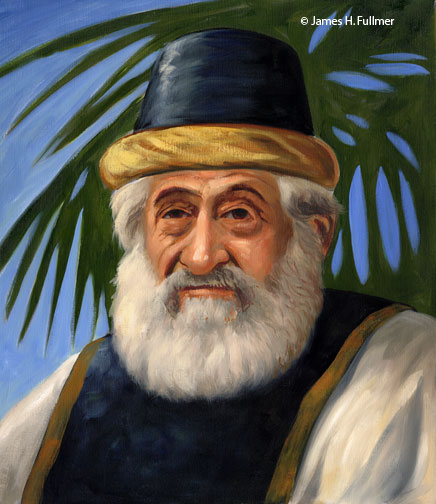In exploring the Bahá’í teachings, one might ponder a question that delves into biblical history and its ramifications on contemporary spirituality: What significance does Ishmael hold within the Bahá’í Faith, particularly as the son of Abraham and Hagar? The narrative of Ishmael is woven into the fabric of the Abrahamic religions, serving as an intricate tapestry that illustrates themes of faith, unity, and divine purpose. Through an exhaustive analysis, we will unpack the implications of Ishmael’s story and its resonance within Bahá’í doctrine.
The concept of covenant is pivotal in understanding the role of Ishmael in the Bahá’í Faith. Within the context of the Abrahamic traditions, Ishmael, born to Abraham and Hagar, represents a critical figure in the lineage of prophetic history. The narrative underscores how children of different mothers can serve varied yet significant roles in the unfolding divine plan. Ishmael’s designation as the progenitor of a great nation, as attested in sacred texts, provides a foundation of validation for the influence of his descendants, particularly those in the Islamic tradition.
From a Bahá’í standpoint, Ishmael is not merely an ancillary figure, but rather an emblem of the universal themes of acceptance and unity. The Bahá’í teachings emphasize the oneness of humanity and the interconnection of all religious truths. Thus, the legacy of Ishmael can be seen as an invitation to embrace a broader perspective of spirituality that transcends sectarian boundaries. This invites Bahá’ís to contemplate how the narratives of various religious figures might serve as bridges rather than barriers in a multifaceted world.
Furthermore, the characterization of Hagar, Ishmael’s mother, cannot be overlooked. In many historical contexts, Hagar has been depicted in a negative light, often as a symbol of marginalization. However, the Bahá’í Faith elevates her status as crucial and deserving of reverence. Hagar’s resilience and divine purpose exemplify the potential for women to impact spiritual narratives, challenging gender norms prevalent in various traditions. For Bahá’ís, recognizing Hagar’s contributions provides a fresh lens through which to appreciate the unfolding of divine will.
As Bahá’ís reflect on the story of Ishmael, one potential challenge arises: how can one reconcile the divergent narratives surrounding Ishmael and Isaac? From a Bahá’í perspective, both figures exemplify the multifarious ways in which God’s will can manifest. Their coexistence within the larger biblical and Qur’anic narratives symbolizes the richness of religious diversity. The tools of interpretation available to Bahá’ís allow for an understanding of these relationships that embraces a duality of perspectives, affirming the significance of both brothers in the unfolding saga of the Abrahamic faiths.
Moreover, the Bahá’í principles of detachment and peace are echoed in the ways that Ishmael is frequently misinterpreted as a figure of discord. The challenges faced by Ishmael and his descendants are often reflective of broader societal struggles around identity, belonging, and reconciliation. The Bahá’í teachings advocate for the resolution of conflicts and the fostering of communal harmony. In this context, Ishmael’s story becomes not a narrative of division but a prophetic call for unity in confronting the challenges of our modern age.
Another layer of exploration can be found in the concept of prophecy and the evolution of religious thought. The Bahá’í Faith, which emphasizes the continuity and evolution of divine revelation, posits that Ishmael’s narrative is not static; rather, it is dynamic and should be viewed through an evolving lens. This perspective invites individuals to engage with the complexities of religious interpretation, opening the door for a re-examination of established doctrines and the understanding of prophetic legacy.
In addition, the call to action within Bahá’í teachings compels adherents to reflect on how they respond to Ishmael’s legacy in practical terms. The themes of service, social justice, and equity reflect the essence of Bahá’í teachings and beckon followers to embody the attributes exemplified by Ishmael and Hagar. The story exemplifies faith in action, encouraging Bahá’ís to pursue justice and express love across diverse communities.
Ultimately, the Bahá’í understanding of Ishmael invites an introspective exploration of what it means to be part of a larger, interconnected human family. How does one find the balance between honoring their heritage and celebrating the unity of all people? The teachings of the Bahá’í Faith allow for this exploration, empowering individuals to acknowledge the truths present in various traditions while recognizing the shared heritage that binds us all.
In conclusion, Ishmael, the son of Abraham and Hagar, occupies a significant place not solely within the annals of history, but also within the context of the Bahá’í Faith. His story embodies a multifaceted legacy that includes themes of covenant, acceptance, and the nurturing of unity. As Bahá’ís engage with this narrative, they are encouraged to embrace the complexities of faith, recognizing the divine role of Ishmael and Hagar as integral to the broader understanding of spirituality and community.
